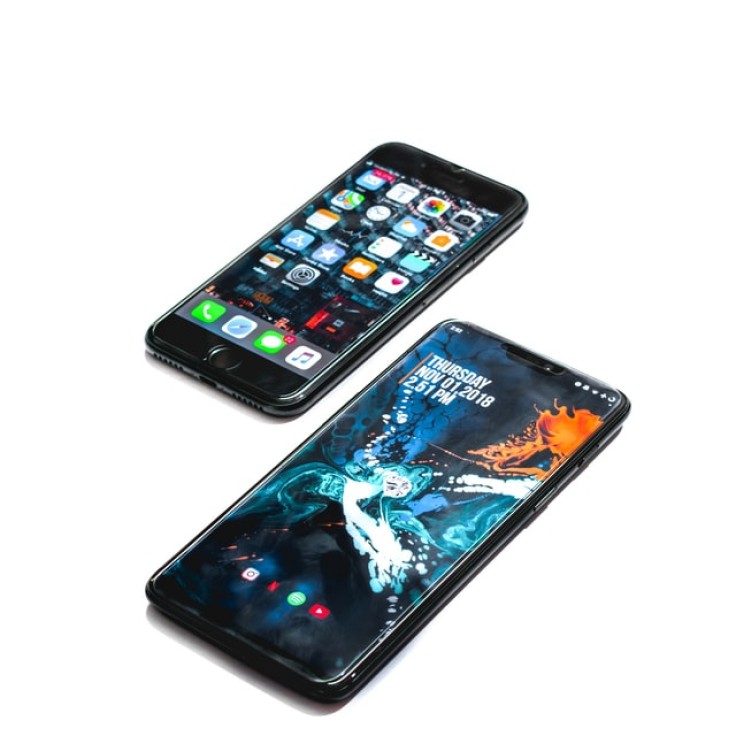
Android vs. iPhone, you say? Yes, it should be Android vs. iOS since we're dealing with software here. But to make the discussion clearer, we'd refer to iOS as iPhone since we'd be dealing with mobile phones and not just the software that makes them tick.
Specs Wars: Is everything about what runs under the hood?
There was a time when people preferred small phones. Back in the day, nobody wanted to have a huge slab of a phone inside your pocket. Nowadays, it seems the tide has turned. Many prefer bigger phones especially those that don't have large bezels. It's common to see people sporting mobile devices that have a six- to seven-inch screen.
But screen size is only half of the game. What matters more are the resolution, color accuracy, and brightness (measured in nits). Apple's iPhone has Retina Display. The colors are crisp and accurate with the resolution ample enough to see details with high clarity for the human eye. On the other hand, Android phones, especially flagship models, sport higher resolution displays but often at the cost of battery life. You can always turn down the brightness to save on battery but that's really sort of like cheating.
Speaking of battery life, since Android is open source, many manufacturers make Android phones that have different battery sizes. Ideally, the larger the better. However, there are certain health and safety limits to this. Energizer made a phone with a whopping 18,000mAh battery but the resulting thickness made consumers shy away from it.
iPhones often have lower battery sizes than their Android counterparts. The saving grace here is that Apple has a monopoly on the devices it makes. Since everything is designed in-house, more often than not, iPhones' hardware and software marriage is fully optimized. The next time you look for your next phone, bear in mind that having a higher battery rating doesn't readily mean longer battery life.
Most phones today serve as dedicated-camera replacements. You surely won't be lugging around your DLSR or mirrorless camera just to take a quick snap of spontaneous moments. Your phone's camera is often sufficient enough to do the job. Just pull it out from your pocket and mash that shutter button like crazy.
iPhones are known to produce realistic photos with minimal AI intervention. Android's lineup of Pixel Phones, however, does a better job in other criteria like lighting, sharpness, and saturation. But to be fair, entry level Android phones often don't have the guts to go toe to toe with iPhone's camera sensors. Quick tip, it's not about how large the megapixels are. It's how good the actual camera sensor is. Ever wondered why a 12-megapixel DSLR beats a 41-megapixel Nokia 808 camera?
Storage is also a key factor. Up to this day, Apple doesn't offer the option for external storage on their iPhones. Not to go too technical, their main reason is that flash (buit in) memory is much faster than add-on memory cards. In comparison, there are many Android phones that offer expandable storage by using micro-SD cards. There's always the option to use cloud storage but it's always beneficial to have a large local storage on your phone for your music and huge library of (cat) videos.
Ecosystem
Apple's iPhones run on iOS. It's a closed software ecosystem. It's too secured that you can't readily install something on your phone that Apple doesn't approve of. This makes the phone a lot safer from malware and virus attacks. In this era of information security, knowing your phone has good security features brings relief every time you go to bed.
Android is on the opposite side of the coin with this one. It's open source. Anyone, with the right amount of experience and knowledge, can tweak an existing version and even upgrade it. If you're a power user who likes to soup up your phone, Android is the way to go. You can practically install almost anything from retro-game emulators to a pseudo-build of Ubuntu Linux. However, this openness leads to Pandora's box. If you're not careful enough, your Android device could easily be bricked if you've been curious enough to install custom ROMs. Viruses are also more common on the Android platform than on iOS.
RAM is also a key factor since it partly decides how your phone can handle multiple apps at a given time. The rule of thumb is, the higher the better. Do take note though the iOS and Android have different implementations on how each OS uses RAM. It's fairly common to see an iPhone with just 2GB of RAM overpowering an Android phone equipped with 4GB of RAM.
Android vs. iPhone: Price, Longevity, and Durability
Most phones today are used as a portable computing machine. We use it to send emails, browse the web, and play games. You may have a gaming PC but you surely can't take it every time you ride the train. Which one lasts longer? It's quite difficult to tell. Apple had its Bendgate Scandal while Samsung had exploding Galaxy Notes. At the end of the day, it's the users themselves who are responsible for their devices. I gave my aunt an LG G3 Stylus a few years back and it still looks brand new to this day.
Most, if not all, Apple devices are very expensive. If you're on a budget, Android offers different tiers of phones based on price. If you're just looking for a basic smartphone, $200 is good enough. Though Apple has its iPhone SE, compared to other Android phones, it's still a bit on the expensive side.









